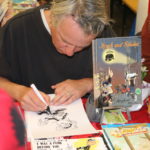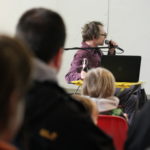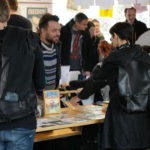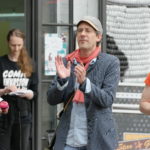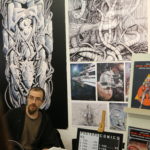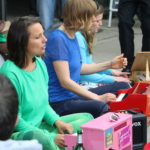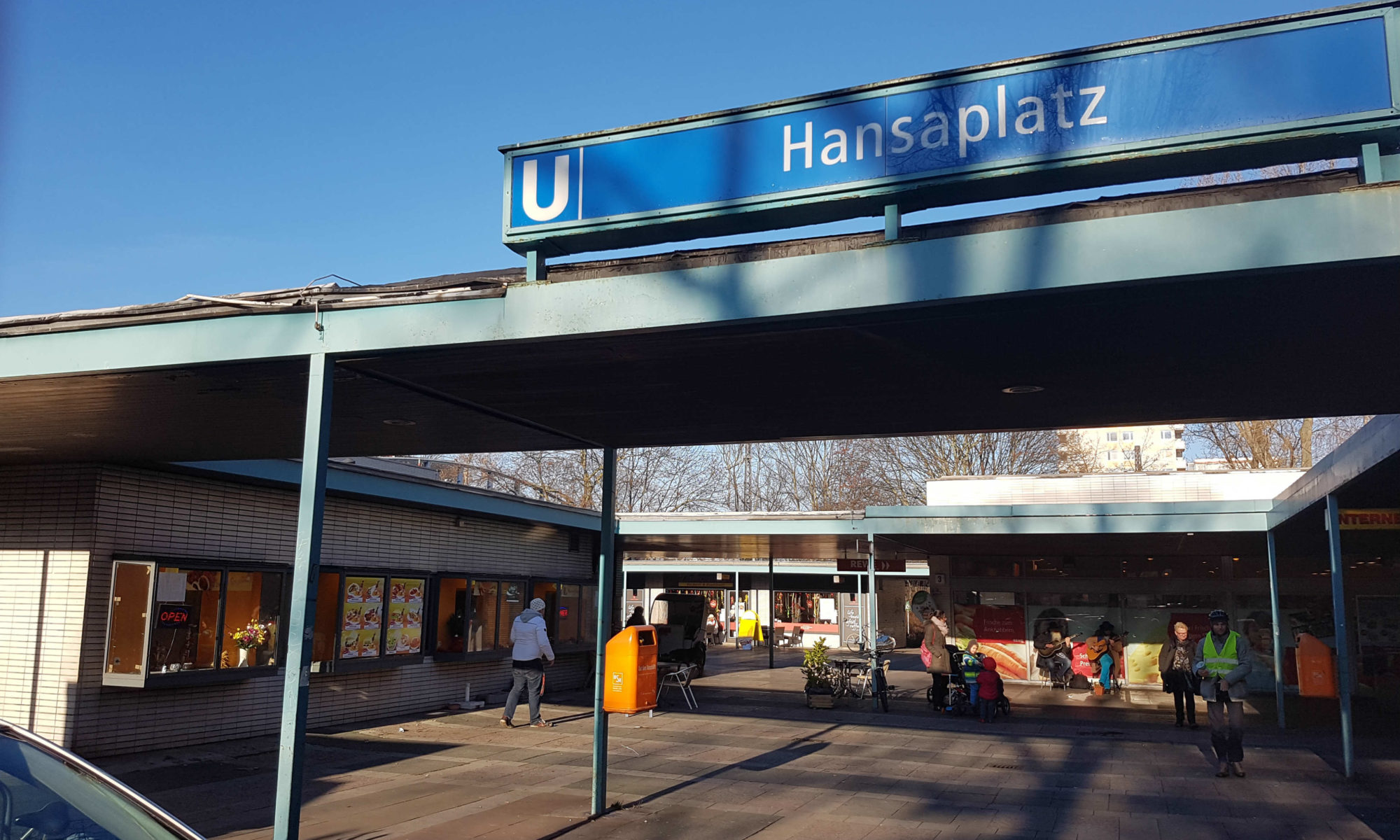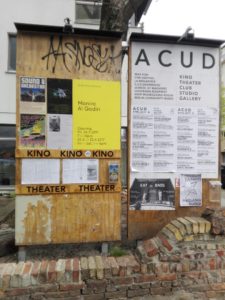Monsterkabinett
Matilde Velho Cabral
Right around Hackescher Markt, the touristy yet hip area in Berlin Mitte, lies Haus Schwarzenberg, an unpretentious space where art and creativity are allowed to flourish.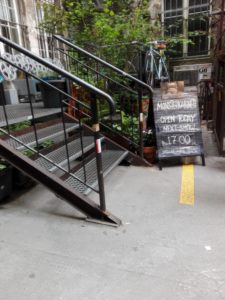
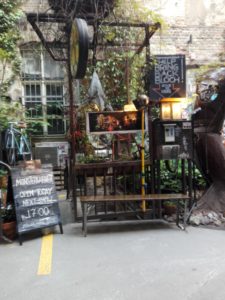


Covered in graffiti, paintings and strange iron objects, in Haus Schwarzenberg you are likely to get lost in a bizarre maze of doors that give way to varied and fascinating attractions: from a museum dedicated Anne Frank’s feelings to an old workshop for the blind, here you can easily spend a whole day without getting bored. Thus, it is in one of those doors that a (not so) well-kept secret is hiding; a parallel electronic universe where metal monster figures come to life to dance your troubles away– Monsterkabinett.
Before entering into the metal abyss of insanity I confess I had high expectations; from what I read on the internet and on the Haus Schwarzenberg website itself, Monsterkabinnet sounded like an unparalleled exhibition, a sample of Berlin’s underground world that would promise to be a complete sensory experience. However, the guided visit ended up looking more like a joke than an actual artistic journey. As I went down the stairs that led to the exhibition, which according to the guide and artist himself would last about 20 minutes, smoke began to fill the room as we gather around one of the first monster inhabitants – and disappointment began to settle in. From room to room (in a total of more or less 4 rooms) we came across different pneumatically powered mechanical monsters, which in my opinion, were just interesting creations to look at for about 5 minutes. Paying 8 euros to do so (6 for students)? Way too much.
The guide really tried to make the exhibition more interesting, by giving the creatures life through his dramatic energy, but at a certain point he just seemed an overly-excited kid who did not get dessert at the end of his meal. After the show he also tried to sell his merchandise and from furry monster wallets to tarot cards with his face on, it was a tough choice to make. Do not get me wrong; I love surreal surroundings and original art shows but “Monsterkabinett” was too much of a bad taste joke.

However, if you are still interested in experiencing it through your own eyes here are the opening hours:
Thursday, hourly shows starting 6:30 pm – 9:30 pm
Friday and Saturday, hourly shows starting 4:30 pm – 9:30 pm
Last show always at 9:30
United we stand
The United States, once a self-appointed haven of freedom representing the American dream, only remain a shadow of their former self after an indignant and angry electoral campaign, where unforeseen lines were crossed and Donald Trump ultimately became the 45th president of the United States. It now seems that the inscription of the Statue of Liberty, “give me your tired, your poor, your huddled masses yearning to breathe free,” is no longer valid for those who are disabled, gay, female or simply unable to afford healthcare.
The votes of angry white men settled Trump’s hateful campaign into the Oval Office. A man whose unique characteristic appears to be his outright hate towards all who are unlike him. With every executive order issued by him, which restricts the rights of others, his followers seem to admire him even more. But for many Americans, life continues as usual, with little effect on their sense of well-being.
However, minorities and other marginalized groups in this country are facing dark times. Not only are or will they be confronted with the loss of some essential rights, such as anti-discrimination laws, legal access to abortion or the right to marry a partner of the same sex, but their individual safety and lives are at risk. Since the election, LGBTQ and anti-racist organizations are already reporting a rapid increase in hate crimes and an alarming number of individuals with suicidal thoughts.
Those reports will only be the beginning of an unimaginable period of hate and discrimination. The terrifying effect of populist campaigns can be observed in post-Brexit Britain. Since their national referendum, the UK faces massive violence against dissidents, with a frightening 57% increase in xenophobic attacks and 147% more assaults on LGBT individuals. It appears that common rules of coexisting were thrown overboard, together with their membership in the European Union.
So white supremacy won – should we concede defeat? Britain’s example shows the tremendous and devastating effect, which populist movements have on the social climate and the same effects can already be sensed in our cities. In times like these, it is not only our right but our duty to fight for the weakest members of our society to defend the core values of our democracy. The emergence countless protest movements can only be the beginning; we owe future generations the rise of an unimaginable civil rights movement to reclaim the forgotten values of this nation: freedom and equality.
Dear Americans, please stand up for those being harassed, listen to the unheard, protest in solidarity with those whose rights are taken away and always remember the ones who lost their lives to injustice. Let’s build a movement to make our country great again, for all Americans to live in peace and equality. You are the change in your community; together we are the change for our nation. Our love will Trump their hate!
Photovoltaic – stream free!
One understands the direct change of the solar energy in a stream by Photovoltaik. For this, the solar cells in which the visible light causes a stream river by means of a chemical reaction are used. The technology is not new, already for over 50 years, solar cells are in use an application. In the beginning, just still enough for a pocket calculator, they drive in the universe even satellites with her gigantic solar leeches. Nevertheless, meanwhile the technology has matured far enough to be used also on the earth, really Each can allow mounting solar cells on the roof or in the back garden. With the rising energy efficiency devices can be driven more and more directly with the sun, for example, park note machines are supplied for some years independent of the stream net. In the end of 2014 possibly so much energy with solar cells was already moved that they could cover together about 1% of the annual stream need worldwide. In Germany, this number lies relatively high, namely with about 7%.
A long time were solar cells because of the high cost unpopular, however, with the Minaturisierung also there came the more attractive prices, so that they are affordable today for everybody. Not only the solar cells themselves but also other components which allow an entire substitute of the electricity supply have sunk in last decades on a fraction of her former costs. The biggest advantage of the Photovoltaic is obvious: The raw material is in stock not only indefinitely. On rainy days memory solutions have to go for a controlled company, however, here. These also lie even today above the costs of fossil fuels, however, one should still consider to change. It is to be supposed that fossil fuels become more and more expensive with the time. More still, the stream net becomes more and more intelligent and it could be already possible during the next 10-20 years to feed stream into the net – to sell to the energy supplier. Therefore a good use would be found even for the “excessive” energy.
As already mentioned and of course also known, the sun does not seem, nevertheless, the whole day and long ago also not on all days sunrays penetrate by the cloud cover. So there are two possible approaches: Either one uses the stream produced by the solar cells to come floating directly around only devices whose use hangs together directly with the weather condition. Or, however, one stores the won stream in batteries. For the first case uses as for example a ventilation system offer in summer. If it is hot, the sun also seems. The cover ventilating fan possibly will run always then when it is necessary. Vice versa it will not be so important in rain or at night that this runs. However, therefore the full need of an arrangement cannot be also covered. The other possibility is by far costlier but offers more far-reaching ranges of application. Island systems, as for example the park note machines, become first thereby possible. Nowadays thus it is to be supplied absolutely possibly a summer cottage with a memory arrangement mounted in the cellar. Then dark nights are illuminated possibly about the stored solar stream. By means of change judges conventional electrical appliances with the stored energy can be also supplied. With the Photovoltaic own small power station is possible already today. And various supports of countries and alliance make this still, in addition, attractive.
The Vegan Meat Experience
With her brown hair neatly tied back, wearing a friendly smile and the red and white tunic with the lettering Konnopke’s Imbiss on the chest, the 23 year old girl welcomes every customer waiting in line to taste a currywurst. Located in the hotspot Prenzlauer Berg, the family business mirrors the image of Berlin. Underneath the U-Bahn station Eberswalder Straße it smells of grilled sausage and the guests standing by the round tables seem to be enjoying every bite of Berlin’s traditional food.
Linda cuts the sausage into small pieces, puts it on a small paper plate, covers it with the tomato sauce which follows the family recipe and tops it off with a piece of bread: “The vegan currywurst, please?!”. A young woman picks up the order and carries the plate to one of the tables where her colleagues are already enjoying their lunch. Each and every one of the young group chose the vegan product.
What has been the eco movement back in the days, is now veganism. It is not only a trend, but also a lifestyle mostly young people in big cities have chosen for themselves. It is not something they follow because it’s hip, but because they feel good eating vegan. The number of vegans, or vegetarians for that matter, is rising constantly.
According to the German vegan association VEBU, in Germany 7.8 Million people are vegetarians and about one Million live a vegan lifestyle. It is estimated that every day another 200 people choose the vegan way and 2000 become vegetarian. Therefore, vegan restaurants, cafés and food products in general are gaining more ground. Because of these developments, there are now festivals and events dedicated to representing this lifestyle. The Vegan Summer Festival in Berlin for example, attracted around 60,000 visitors. Not only vegetarians and vegans but also people who are curious about the new lifestyle can sneak a peek.
Especially in rather alternative and young neighbourhoods like Kreuzberg, Prenzlauer Berg, Friedrichshain, Mitte and Neukölln vegan places are omnipresent, so that also meat and seafood lovers take up the offer. The wide range of vegan food makes it easy and accessible for everyone. Vegan restaurants and cafés such as Vaust, Viasko & Vöner belong in the city just as Konnopke’s Imbiss and Mustafa’s Döner.
The U.S. Food Magazine Saveur called Berlin “The New Vegetarian Capital”, and shops like The Vegetarian Butcher in Kreuzberg prove that Berlin deserves that title. Yes, the new generation is used to vegan “Schnitzel” or even the vegan “Burger”, but the worldwide first vegan butcher Jaap Korteweg goes one step further- some would say too far- selling chicken strips, beef and meatballs, but everything is vegan. Korteweg grew up as a farmer in the Netherlands, but when the swine flu and the mad cow disease reached his country, he decided to become vegetarian. “I missed the taste and structure of meat a lot and had to think of something that would replace meat perfectly.” With the help of top chefs, he created the perfect illusion to convince meat lovers they don’t have to give up the taste of meat altogether.
The butchery at the Bergmannkiez is well-patronized. Mainly young families and apparently higher earners can be seen in the store looking at a variety of fresh products, snacks like tuna wraps and frozen food. The blond attractive woman at the counter is called Sybille, holds a PhD in German Literature and is pushing a brand-new navy blue buggy with a vintage look. She is concerned with her family’s health and eats strictly vegan herself. Her daughter Mia is 8 years old and knows what she likes the best. The chicken strips for lunch “but without the dead chicken inside”. She has a rabbit at home and says every animal should live like her beloved “Amelie”.
The love for animals and the profound resentment of factory farming is one reason to lead a vegan life. Another reason is that more and more people decide for a healthy nutrition. That shows also in the book trade. Only three vegan cook books were published in German language in 2010, whereas in 2016 there were 211 releases according to VEBU.
Attila Hildmann shows with his famous vegan cook books that being vegan does not mean leading a boring life, eating always the same and being the pale and skinny person a lot of people still imagine. The fit and convinced vegan author is a role model for a generation, which is concerned with a conscious lifestyle. “You can change your body completely in only 30 days” is the message with which he has managed to convince people around the world of veganism. Since he has published his books during the rise of the vegan movement, he has become one of the most prominent figures of this wave.
Linda Konnopke, who studies marketing management, knew that their 85 year old family business had to be open to new concepts. She is part of the young generation which is always trying to make the best of themselves and their time. “We wanted to keep the tradition of course but also move with the times. The vegan option which is 100% soya is very popular now.” They sell the vegan currywurst since may 2015. The traditional currywurst costs 1,90 €, the vegan “Wurst” is 2,50€.
Vegetarian and Vegan products have made their way to the center of society but they are still more expensive than their meat counterparts. But people in Friedrichshain, Prenzlauer Berg and Kreuzberg are willing to pay for a better lifestyle. There are by now three Veganz supermarkets in Berlin only selling vegan products but also in regular supermarkets vegetarian and vegan meat substitutes are becoming more visible.
Not visible enough argues Christian Schmidt the German minister of agriculture. He wants to forbid names like vegan or vegetarian “Schnitzel”. In an article on their homepage, the newspaper Handelsblatt quotes Schmidt saying that it would be “completely misleading” for the consumer. He seems to underestimate the intelligence of the buyer. This brings up the question if anyone craving a beef steak has accidently bought a vegan substitute. Julia Kuttler, business psychology student in Berlin and vegetarian for 8 years, who only recently came from Colorado, U.S.A. and cannot find anything confusing about the meatless products. “Products have very clear packaging here in Germany. In the U.S. “chicken” would become “Chick’n”, which could be an extra help for people who are not familiar with substitute products”. In Germany a big green “V” with a leaf on one side is emblazoned on the packaging.
At the end of the day, the currywurst remains a symbol of the German capital and it is not possible to imagine Berlin without snack bars like Konnopke’s Imbiss. “If you come to Berlin you don’t want to miss out on the currywurst experience, even if you decided for a meatless life”, says the American girl with a smile on her face. The mere fact that an old traditional food such as currywurst is adapting to this new lifestyle is a sign of the changing times. Today veganism no longer means sacrifice, but rather openness to a new lifestyle and new experiences.
“They Even Are Eating The Swans Now”
Lennart Richter
Rosemarie Emmler (89) is a first tenant in an apartment in Hansaviertel, an area once considered to be upper class.
After being nearly completely destroyed during World War II., ambitious Bauhaus-Projects were realized here in the sixties.
Hansaviertel represented a new Berlin. Inmidst of nature, surrounded by the Tiergarten and in immediate proximity to the Spree, people were living isolated from the hustle and bustle of the big city for a long time. But during the last couple of years, the quarter has noticably changed:
“We were very happy when we first were accepted for buying an apartment here. But that was a long time ago. The Hansaplatz is not what it used to be.“
Back in the day there were a lot of small shops and even a cableway, but nowadays the Hansaplatz is mainly dominated by a cornershop. “It’s dirty everywhere and people are afraid to go outside after sundown.“ The Hansaplatz is inhabited by dubious persons, rumours of thievery and burglary are going round, she says. “It’s all the fault of the Homeless.“, complains Mr Thuy (32), one of Mrs. Emmler’s neighbors.
“They are urinating in the entrances, relieving themselves in hallways. I heard, they even are eating the swans now. Something has to be done about this.“ Mrs. Emmler nods as she has heard of this too.
Still she says: “Well, they have to go somewhere. But at least some public toilets would be in order.“ The tense situation seems to be also known to the officials responsible.
Thomas Isenberg, whose office is located directly at Hansaplatz, is sitting in the Berlin Parliament for the SPD and regularly hosts civil dialogues with the topic: “Security and cleanliness in Hansaviertel“. He’s openly addressing the increasing dereliction in the area:
“According to recent estimates, Berlin has seen an increase of 800 Homeless people in 2016 alone, many coming from Eastern Europe and the Balkan States. Tiergarten and the area around the Hansaplatz developed into some kind of meeting place for the Homeless. This situation is significantly burdening the residents.“
He says it has become grimy everywhere and ciminal incidents, especially those related to drug use and -trafficking, have increased. To steer the quarter back in a positive direction, a dialogue between all parties would be necessary:
“It is important to provide help for both sides – that’s why more presence of the police and the municipal office of public order, aswell as social workers is needed.“
Berlin has a general problem with an increasing number of Homeless people indeed. Estimates of social organisations are putting the figures between 3.000 and 10.000, the social administration of of Berlin is not gathering official figures. Especially Tiergarten provides many advantages for homeless people due to it’s vastness and the proximity to the Bahnhofsmission and the Caritas.
Just recently a “wild camp“ in the Tiergarten was dissolved by the police with prominent accompaniment of district mayor Stephan von Dassel (Bündnis90/Die Grünen), who gave “Pollution“ and the “Killing of park animals“ as reasons, according to the Tagesspiegel.
And although the pollution caused by the homeless is clearly visible everywhere around Hansaviertel, the often deplored criminality seems to be more of a feeling than the factual truth:
“We could absolutely not find an increase of criminality rates in Hansaviertel during the last years. Actually, the former Status of a High-Crime-Level-Area that was in place because of drug-related criminality around the subway station, was lifted in the first quarter of 2016 because the numbers did not justify it anymore.“ said Mario Kanisch, Police Commisioner and Head of the second service group of Police Station 34.
Nonetheless many residents are worried. In the district, where „Merkel must go“ is written on every second corner, some are growingly giving vent to their frustration: “An aggressive mood is prevailing around here.“, says Martha Wegewitz, board member of the Berliner Obdachlosenhilfe e.V.
The social club used to organize a soup kitchen at Hansaplatz every sunday, where their volunteers often were insulted by residents, sometimes even threatened: “Once an elderly man came by with a camera. He documented everything we did and threatened to come back with at least ten of his friends unless we got out of there immediately.“.
About the alleged origin of the homeless she says: „In Berlin, there are many people without a place to live coming from other EU-countries, mostly from Poland. But the bigger share of homeless people from Berlin are still coming from germany.“ .
Where all the hostility is coming from, Ms. Wegewitz can’t explain.
That’s why she is thankful for constructive proposals from residents like Mrs. Emmler, although she doesn’t see much chances for public toilets: “They are searching for a fast and final solution. Follwing the logic of the responsible officials, such measures would only attract more homeless people“. With the coming of the new year, the clubs allowance to serve food at Hansaplatz has been revoked by the local supermarket.
According to Mrs. Wegewitz, this is not the first sign that homeless people aren’t welcome in Hansaviertel anymore. At the first of Thomas Isenberg’s civil dialogues, members of the club were invited to represent the point of view of the homeless. Although they gladly offered to speak again at the second dialogue, they were explicitly only welcomed as spectators.
Mrs. Wegewitz says, Thomas Isenberg and his employee Marlon Bünk are doing everything so that until the upcoming sixtiest anniversary of the world cultural heritage Hansaviertel is held, even the last homeless disappears: “Mr. Isenberg wants, that the shops around the Hansaplatz stop selling to homeless people and that residents complain to the police about trifles so that the status of a High-Crime-Level-Area is reintroduced. He is bothered by our soupkitchen aswell – his concept is based on trying to solve social and political issues with the police.“
Instead of more police presence, she is promoting a neighborhood service, where residents voluntarily act as mediators between other residents and the homeless. “This is the only way to ensure that on the long term, both parties can live peacefully, side-by-side. What many tend to forget: Not having a home does not mean to have less rights.“
Another person that wants everyone in Hansaviertel to get along is Salvatore (44).
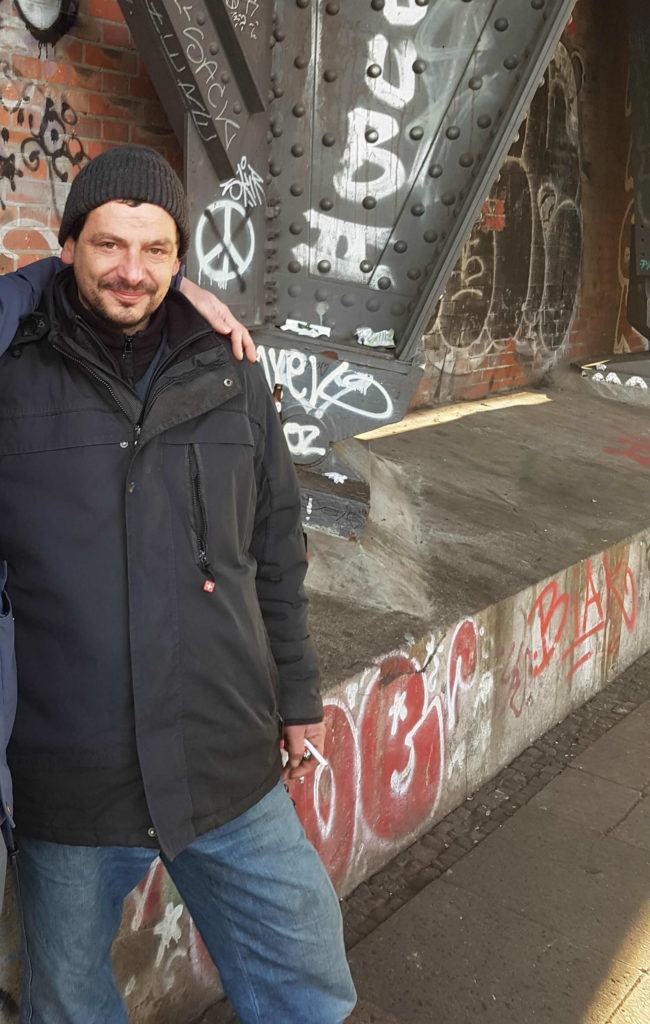
He is homeless and has been living around the area for seven years now: „There are the good guys and the bad guys.“. At the moment, he is camping under a brigde behind a supermarket. On Hansaplatz he received a dismissal from the police, as many of his friends did too. “We’re humans too. Of course the residents think it sucks when people are polluting everything. But me for example, I sweep my part of the street every day. Since I’m here, it has become cleaner than before.“.
Nevertheless he is subject to a broad variety of animosities. Residents are insulting him, one of the shop owners supposedly hit him several times with a stick. The police used to tolerate homeless people in the quarter, but he has been feeling picked on for some time now:
“They come around because of nothing. Some assholes call in, then the police comes and hassles us. In the end, they always have to leave because we didn’t do nothing.“ . And anyway, times would have changed at Hansaplatz: “This used to be a proper place where everybody could live. That’s why we all know each other. But by now everyone is against us, nobody is selling us anything except for the cornershop and even the subway station is now closed during the winter.“
The upcoming anniversary was news for him. In fact he says, Thomas Isenberg has never spoken to him or one of his „Brahs“ so far, as he calls his fellow companions. But he is not in fear of being driven out of the district anyway:
„Here are the Zoo and the Tiergarten. Sex, Drugs and Rock and Roll. They will never succeed to get rid of the people here, they will always come back.“
Busy Weekend Coming Up in Berlin
Jorge Satorre Mulet
Since 1985, the last game of the footballing season in Germany has taken place in Berlin: the DFB-Pokal final. Even though some rumours arose that in the near future the final could be hosted in China, the president of the DFB (Deutscher Fussball Bund), Reinhard Grindel, ruled that option out, calming millions of German fans that want to preserve the tradition of their beloved trophy.
The weekend of the 27th of May will be a busy one in the capital of Germany, as apart from the final, the German Protestant Church Congress will also take place. This will have Barack Obama as its star guest, being his first public appearance in Europe as former US President.
In order for the weekend to run smoothly, the areas where both sets of fans will have their fan zones have already been assigned. Following the recent tradition, the Dortmund followers will gather at the Breitscheideplatz, a place they have frequented for four years in a row. This time, the borussers will be the home team. Interestingly, it is of note that Dortmund has prevented Berlin from having a team in the final, after beating Union FC and Hertha BSC along the way
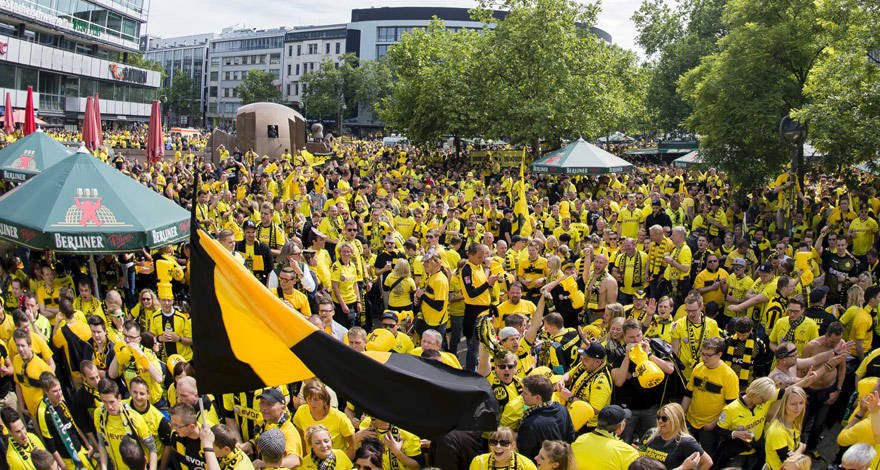
On the other hand, the Eintracht fans, who are seeing their team reach the final after eleven years without starring in it, will have their fan zone located in Alexanderplatz. The Frankfurters, despite being the theoretical away team, will be siting at the famous east curve of the Olimpiastadion.
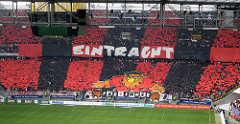
Many fans that will flood the city will not be able to attend the game, but that should not be a problem. Different locations such as the Sommergarten from the Berlin Messe will hold public viewings so that no one misses this epic encounter. Also, during the whole day, fans will be able to photograph themselves with the trophy, as it will be exposed first at the Rotes Rathaus and after that in both fans zones. It will definitely be a very intense and special weekend for everyone present in the city.
The End of a Love Story?
Philipp Sanderhoff
With Berlin’s international vibe and an almost endless cultural life, Milka Agbenou, a 26- year-old Frenchwoman, felt instantly drawn to the city. “It was love at first sight. Berlin offers the diverse possibilities of New York and Paris for an affordable price.”
Like more than 22.000 other of her fellow citizens, Milka enjoys the freedom of movement within the European Union, which allows her to live and work in Berlin without any major administrative barriers. For young urban cosmopolitans like her, it’s become a substantial part of their identity to relocate freely. But this right, as self-evident as it may seem, is in the utmost danger.
“The election of Marine Le Pen as the next president of France would have a disastrous impact on my life,” believes Milka. “As a young woman of color who rather identifies as European than as a proud French citizen, I represent the image of the enemy for her.” And Le Pen would have the power to doom those enemies: If she goes through with her election promise to leave the European Union, many French abroad could instantly lose their work permit and therefore their whole basis of life.
But for Milka this would only be a share of the idignity she fears to face: “With the subtle normalization of racism in the public discourse, Len Pen could make it impossible for me to move back to France in the future. I may not only lose my newly found home in Berlin but also my French roots.” Her grievous voice in these brief moments of despair contrasts with the enthusiasm and positivity which this young woman radiates.
“Le Pen wants to see me dashed to the ground with bitterness, but I refuse to be a victim. I will fight for my rights!” It’s the hopeful voice of a European cosmopolitan that sheds esperance on the future of France and Europe. May her voice be heard.
BFC Dynamo vs. SV Babelsberg 03–How politically involved are football players?
Mirko Lorenz
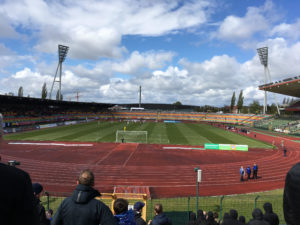
Away days at Friedrich-Ludwig-Jahn Sportpark are never easy. BFC Dynamo Berlin, which hosts the majority of home matches at the famous East Berlin stadium, has had a massive hooligan scene since the GDR era. In 2006 a match against Union Berlin was cancelled after heavy fights on the pitch. In 2011 BFC supporters entered the away sector to batter fans of Kaiserslautern after being eliminated from the cup. Witnesses said security agents opened the gates and did not bother to do anything about it. According to police statistics BFC Dynamo has the largest number of violence-oriented fans in Germany. In addition a severe part of those “problematic” fans have a right-leaning political background, whereas todays opponent is the opposite. The fans of SV Babelsberg 03 are widely known to fight against racism, nationalism and homophobia.
Though circumstances were hinting towards an extraordinary match this Saturday, when BFC and SVB met for the 30th match day of Regionalliga Nordost, everything turned out differently. Players and spectators took a rather relaxed approach, the stadium almost counted more police and security staff than fans and the match slowly shifted towards the end.
Ten minutes before final whistle Dynamo was able to tie and five minutes later a cross ball flies through Babelsberg’s box. Dennis Srbeny is completely open and heads it in. 2:1 Dynamo. Frustration emerges in the Babelsberg sector, which turns to anger when Srbeny comes closer. Instead of turning towards the BFC crowd, he approaches the Babelsberg fans and provokes them with a celebration including Boris-Becker-remembrance-fist-pumps. Several fans climb the fence and yell various curses at the opponent’s striker.
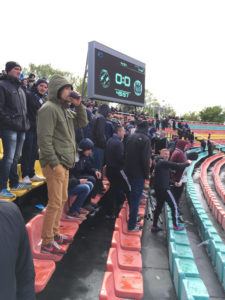
Surprised by Srbeny’s unorthodox celebration—as well as the fact, that the teams somehow managed to score three goals—I turn to my neighbour. “Do you think he is aware of the situation? Does he have a political intention?” He is surprised as well. Concerning the previous actions—on and off the pitch—the celebration was totally unexpected. The fans did not provoke the striker in any way, nor was it a brutal match. Completely unnecessary, I think and start to believe he wanted to show his disfavour of Babelsberg. After reflecting briefly this scenario seems unrealistic as well. On the one hand, because I am not sure if Srbeny is even aware of the “special” rivalry and on the other hand, political intentions of football players as rare as incorrupt officials. I also assume players do not always deliberate goal celebrations.
Back at home I look up the striker. “Dennis Srbeny, born in Berlin, 5th of May 1994, is a German football player. He plays for BFC Dynamo since 2015”, his bio on Wikipedia says. So Srbeny could actually be aware of the situation between Dynamo and Babelsberg, which does not imply he had intentions. Srbeny’s Facebook page delivers some important information, but cannot solve the case completely. He likes a couple of football clubs, media outlets, musicians, models and other celebrities. Pretty standard, definitely not right-wingy. He obviously likes his current club BFC Dynamo as well as all his previous ones: Hansa Rostock, Hertha Zehlendorf and TeBe Berlin. TeBe is overwhelmingly left-leaning which supports the assumption that Srbeny is either not aware of a political clash or does not care about it.
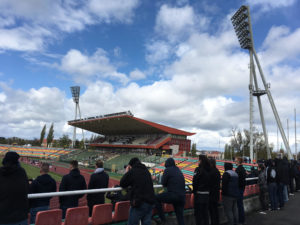
Sometimes a match is about more than football, but in this case Dennis Srbeny is propably the only one who knows. Or maybe he does not even know himself.
“Achtung Berlin! – New Berlin Film Award”
Jérémy Gentit and Matilde Velho Cabral
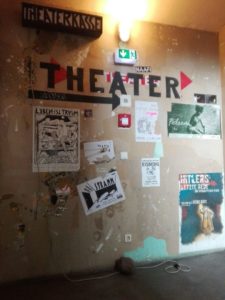
In Berlin there is always something to be seen or to be done and if you are a movie connoisseur or just a regular enthusiast, the Berlin Film Festival “Achtung Berlin! – New Berlin Film Award” is definitely the right choice for you.
Taking place every year since its foundation in 2004, the popular temporary festival is already in its 13th edition and from the 19th to the 26th of April guests have the opportunity to see pieces yet to debut in selected local cinemas with the attendance of the film crew and cast.
The specialty of the week-long festival is that the only films shown are ones that have been completely or in part made in Berlin and Brandenburg. Guests can choose from categories such as documentaries, short films, retrospectives, independent films and co-productions.
As a true meeting point between popular veteran directors and upcoming young talent, “Achtung” is already the third largest film festival in Berlin, and its exciting workshops, film parties and panel discussions provide a creative space for the exchange of ideas. However, its promotion is still a bit obscure and locally based, which can make it difficult to access despite social networks.
Theaters include are:
Babylon – www.babylonberlin.de
City Kino Wedding – www.citykinowedding.de
Eiszeit – www.eiszeit.berlin
Filmtheater am Friedrichshain – www.yorck.de
Kino International – www.yorck.de
Lichtblick-Kino – www.lichtblick-kino.org
Neue Kammerspiele Kleinmachnow – www.neuekammerspiele.de
Volksbühne am Rosa-Luxemburg-Platz – www.volksbuehne-berlin.de
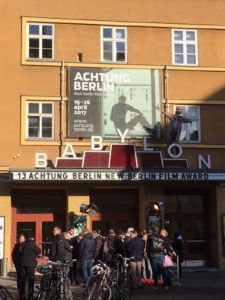
The 13th Achtung Berlin festival drew to a close two days ago and after an incredible film’s marathon week, the awards ceremony was held at the legendary Babylon Kino on the 26th April. If you missed the opportunity to attend this year’s festival, you can take a peek at this year’s winners here:
A total of 13 winners were chosen according to individual categories:
- The new berlin film award in the category Best Feature Film.
THE HANNAS Director: Julia C. Kaiser
- The new berlin film award in the category Best documentary
SCHULTERSIEG Regie: Anna Koch
- The new berlin film award in the category Best Screenplay
THE HANNAS
Screenplay: Julia C. Kaiser; Director: Julia C. Kaiser
- The new berlin film award in the category Best Production
FREDDY / EDDY
Production: Tini Tüllmann, Director: Tini Tüllmann
- The new berlin film award in the category Best Director
FREDDY / EDDY Director: Tini Tüllmann
- The new berlin film award in the category Best Camera
SCHULTERSIEG
Camera: Julia Lemke, Director: Anna Koch
- The new berlin film award in the category Best Actress
Anna King
Film: THE HANNAS
- The new berlin film award in the category Best Actor
Till Butterbach Film: THE HANNAS
- The new berlin film award in the category Best Mittellanger Film
QUEEN OF NIENDORF Director: Joya Thome
- The new berlin film award in the category Bester Kurzfilm
PANDA III
Director: Maximilian Villwock
- The new berlin film award in the category courageous short film
MILK CAP 3 PAPER Director: Tim Kochs
- The new berlin film award in the category Best documentary medium / short
GARDEN OF THE STARS
Director: Stéphane Riethauser, Pasquale Plastino
- The prize of the Ecumenical Jury
ER SIE ICH
Director: Calotta Kittel
- The updated price of the German Film Critics Association (VdFK)
VANATOARE
Director: Alexandra Balteanu
- The Exberliner Film Award
CLUB EUROPA
Regie: Franziska M. Hoenisch

